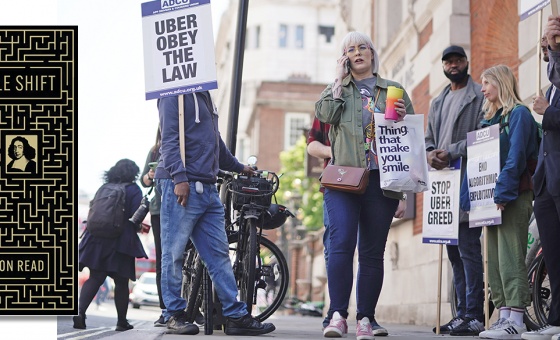This is the last article you can read this month
You can read more article this month
You can read more articles this month
Sorry your limit is up for this month
Reset on:
Please help support the Morning Star by subscribing here
THE constitution is firmly back on the agenda in Scotland following the SNP convention in Dundee last week, which was called to discuss the way forward on independence.
Although no votes were taken, the SNP leader Humza Yousaf seems to have won the day with a commitment that if the SNP wins a majority of seats in the next general election in Scotland, then it would seek negotiations with the Westminster government on how to “give democratic effect” to the country becoming independent.
For Yousaf, that remains a referendum. His speech, designed for party activist consumption, still has the SNP going it alone, leading Scotland to independence on a new constitution as yet to be agreed upon.
Other voices in the SNP sound a good deal less monolithic in their approach. As the Morning Star pointed out in Voices of Scotland last week, Simon Barrow, national secretary to the SNP trade union group, wrote in Scottish Left Review (in a personal capacity) that independence groups need to build alliances with labour movement groups.
Even SNP minister for independence Jamie Hepburn acknowledged that a deal with Labour on a multi-option referendum was something that would have to be considered.
The Scottish Labour leadership is very unlikely to be interested in any such dialogue. The belief that Scottish Labour can win a significant number of Westminster seats will give Ian Murray and Dame Jackie Baillie even greater cause to dismiss anything that widens debates beyond a Labour majority in the 2024 general election.
And while the SNP and Gordon Brown debate future constitutional proposals, right now the Tories are attacking our existing rights.
There has been, and continues to be, a swathe of legislation pressing at the edges of our “unwritten” constitution.
The executive can push legislation through the House of Commons with little scrutiny and very little opposition. If it were not for the Socialist Campaign Group of MPs there would be a dire shortage of Labour MPs contributing to debates. Ironically, there is more resistance from that constitutional anomaly the House of Lords.
Our constitution is a flimsy web of procedures, bits of antique documents and charters that can be abolished at will.
It does not have the checks and balances that constitutions need to stop rule by the executive, or in the UK, by the Prime Minister. We can expect further attacks on human rights before the next election while this government has its large majority.
What to most people appears an impenetrable and obscure issue at times is vitally important, particularly for rights, including the right to strike. We simply do not have the constitutional right to strike except by international treaty, and this is now being overridden by legislation. Any piece of legislation that we believe was a victory can be overturned by the next government.
It is therefore worth considering whether there are rights and obligations that ought to be enshrined in a written constitution.
The SNP produced a paper last week that attempts to shape what could be a written constitution for Scotland. It plans an interim constitution to be in place from day one of independence and then to establish a constitutional convention to draft and put in place a permanent written constitution.
While independence does not look imminent, despite the SNP’s recent convention position, nevertheless, it gives an understanding of the SNP’s vision of an independent Scotland.
It is more what is absent that gives cause for concern rather than what is included. To begin with, it does not acknowledge that the ownership of our economy is fundamental to other rights.
And while it wants to give constitutional recognition to the NHS that is without a constitutional guarantee of funding and a constitution that only deals with political rights without economic rights will never be accountable to the majority. It will be for the benefit of those who already have political power and wield it for their benefit.
Making a new constitution is no easy matter, even for the left. Chile has been going through this process and it began with huge popular support.
It started with a successful referendum for change, but when it went back to put a model constitution to the people it included issues that allowed the Chilean right to campaign against it.
For example, a constitutional right to abortion was used to undermine working-class Catholic support for the government. The left is now in limbo while the far right has made up the ground it had lost.
In Labour, Brown is determined to keep the issue alive within a party leadership that doesn’t have any real interest in it. He produced a report last December through a process that was far from being inclusive and transparent, but it has forced Keir Starmer to make commitments for the next manifesto.
The report attempts to rethink the democratic structures of Britain and link them to economic renewal, but its central flaw is the failure to recognise that there is a fundamental conflict of interest between those who have power, wealth and privilege — and those who do not.
So when the report aspires to a new Britain that should “be grounded in shared values and aspirations that unite people across our country and make it possible to build new constitutional foundations,” it is starting from the false premise that values and aspirations are shared.
Some of the recommendations made in the Brown paper could form the basis for a serious discussion about how four nations and disparate regions can share power without being dominated by Westminster and the City of London.
It makes the case for decisions to be taken as close as possible to the people they affect, and it also wants to put in statute constitutional protection of social rights through basic minimum standards.
To introduce a radical constitution, however, we would first have to win a party — the Labour Party — to push through such transformative changes.
It will require a clear political strategy based on a fundamental change in the ownership and control of our economy. The left would then need to be able to win the widest possible support for the outcomes of such ownership.
Such change is possible. It happened in 1945 and 1948 when voters knew there had to be a radical change and trusted the Labour Party to deliver it in the interests of the many.
To ever get back to that point we need a very different Labour leadership from the one we have now. We had a small taste of what was needed in 2017; when we get that chance again, we need to have clear strategies in place to deliver.
That is work that should begin now. Mourning the loss of an important opportunity that the Corbyn leadership gave us is understandable — necessary even. But now we need to organise.
Pauline Bryan is a Labour peer and convener of the Red Paper Collective.











